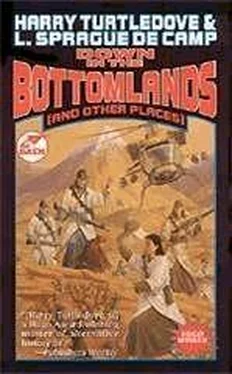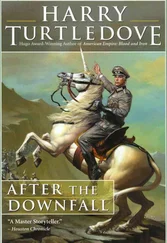“I’ve seen that you speak sooth,” Park agreed, admiring such diligence without sharing it. He continued, “Now we have one mair thing to do.” His stomach rumbled, interrupting him. “No, two mair-first lunch, then on to the steamboat.”
“You’d never make a worshiper of Patjakamak,” Ankowaljuu chuckled, glancing at Ib Scoglund’s incipient bay window (all along the wheel of if, Park’s analogs ran to plumpness). “For some of our festivals, we fast three days straickt.”
That idea did not appeal to Park at all. Eric Dunedin came to his defense: “Aye, Judge Scoglund’s not thin-”
(“Thank you too much, Eric,” Park said, but Monkey-face was going on) “-but he’s wild for bodily fitness: he drills himself most mornings, with sitting-ups and I don’t ken what all else.”
“Is that so?” Ankowaljuu stood face-to-face with Park, set his right foot next to the judge’s, and seized his right hand. “Let’s see what his swink has got him, then.” He locked eyes with Park. “First man to pull the other off kilter wins.”
“All rick, by God!” Park said, going into a half-crouch. “Eric, count three, to give us a mark to begin at.”
He almost lost the match in the first instant, when the absurdity of Indian-wrestling a veritable Indian hit him. But the painful jerk Ankowaljuu gave his arm made him stop laughing in a hurry; He and the tukuuii riikook swayed back and forth, tugging, yanking, grunting. Finally Park, with a mighty heave, forced Ankowaljuu to take a couple of staggering steps to keep from falling. “Ha!”
Ankowaljuu opened and closed his hand several times to work out the numbness. “You cauckt me by surprise there, Judge Scoglund,” he said reproachfully.
“I didn’t know that wasn’t in the rules.” Park grinned.
Ankowaijuu raised an eyebrow. “You should be a tukuuii riikook yourself. You look to getting around rules that make trouble, not just blindly carrying them out.”
“Not so much to getting around them. That would be bad in a judge. But in reckoning the rick onputting of them-”
“Aye, there’s the rub,” Ankowaljuu said. Park blinked; Ankowaljuu, most certainly, had never heard of Shakespeare. The Skrelling went on, “I will own, this not being any hick holy day, my belly could do with filling too. Shall we see what good food Mankoo has in store?”
“Not mair monkey heads, I hope,” Park and Dunedin said in the same breath. Ankowaljuu laughed. “Sooth to tell, so do I.”
Had anyone told rising young prosecutor Allister Park that within three years he would be sailing down tributaries of the Amazon, he would have called the teller crazy. Had the fellow gone on to say he would be bored doing it, he would have laughed in his face.
But bored he was, in short order. Neither the Muura nor the Huurwa was a big enough river to be impressive in its own right, and one stretch of jungle looked much like another. Of the riverboat’s crew of three, only Iispaka the pilot spoke Ketjwa, and he was so taciturn he might as well have known no language at all.
Thrown back thus on his own resources, Park plunged into his books. By both inclination and training he was a creature of the printed page; he was convinced the answer to the endless strife between Tawantiinsuuju and the Emirate of the Dar al-Harb was set forth there, could he but find it.
Monkey-face had learned to leave him severely alone when such fits came upon him. In them, he often bit his thane’s head off. Other times, as when he was learning Ketjwa, he insisted that Dunedin share his zeal. To his servant, that was worse.
Even the air of good cheer Ankowaljuu cultivated wore thin as Park kept his nose in his books and spoke almost as little as Iispaka. Only the swarms of mosquitoes that buzzed endlessly round the steamboat made him sit up and take notice — their bites roused him to brief spasms of insecticidal frenzy.
Then one day, about a week after they had left Iipiisjuuna, Park slammed shut the volume in which he’d been lost.
“Tell me,” he asked Ankowaljuu, his voice suddenly so mild that the tukuuii riikook gave him a suspicious glance, “does your faith out-and-out forbid you from writing down what you believe in?”
“No one ever does,” Ankowaljuu said after a moment of frowning thought. “As you’ve seen, we of Tawantiinsuuju pride ourselves in heartlearning everything we need to know.”
“Aye, aye,” Park said impatiently, “but that’s not what I asked. I want to know if you may, not if you do .”
“But why would we want to?” Ankowaljuu persisted.
Park rubbed his chin. “Hmm. Reckon you had an upgrown man like, like me, say, who wanted to become a changer to the faith of Patjakamak. Upgrowns aren’t as good at heartlearning as children. Would you be allowed to put things in writing to help him grasp your faith?”
“Like you?” Ankowaljuu said. “Is that why you’ve been toiling so hard: because you’re thinking on joining the brotherhood of the sun and the All-Maker?” His English failed him; with shining eyes, he switched to Ketjwa: “We would welcome you, my friend.”
“I thank you.” Park felt like a heel — he had no intention of converting — but plunged ahead: “Could you make such a writing for me?”
“Aye, and I will,” Ankowaljuu promised. After that first moment of emotion, he had his English back. “You are rick: the writing in itself is naught shameful nor sinful, and so you will have it as quick as is doable.”
That did not prove so quick as either Ankowaljuu or Park, for rather different reasons, hoped. A search of the ship revealed only three or four sheets of paper. “Why more?” Iispaka demanded when the two eager men upbraided him for the lack. “I don’t write.”
“Where’s the nearest storehouse?” Ankowaljuu asked. Public storehouses in the towns and along the highways of Tawantiinsuuju kept vast quantities of all sorts of supplies against time of need.
“Next town is Tejfej,” Iispaka said. “Maybe two days away.”
Ankowaljuu fumed at the delay. He spent as much of the intervening time as he could preaching at Park, perhaps expecting oral argument to work as well as written. To the tukuuii riikook ’s disappointment, Park responded by diving back into his books. While he was studying, he could ignore distractions.
He could not so escape Eric Dunedin. When they were bedding down on deck under mosquito netting, his servant whispered, “Do you really have truck with that heathen foolishness? I ken you’re truly no hallow, and even if you were, you left the church to take up your judgeship. But I thock you still a Christian wick.”
“I am,” Park said after some moments’ thought. “All the same, though, I need to learn as much as I can about faithly dealings here, for the strife between Tawantiinsuuju and the Emirate is ungetawayably tied up in ’em.” He paused again. “D’you believe me?”
The answer mattered to him. Dunedin was friend as well as thane. Relief flowed through him as the small, wrinkled man said, “Reckon I do. If I can’t trust you, I can’t trust anyone.”
“Thanks, Eric,” Park said softly. He got no reply and repeated himself, a little louder. Still no answer, only soft, regular breathing. Monkey-face was asleep. Park let out a snort of laughter and joined him.
That night, they passed from the Huurwa to what Park persisted in thinking of as the Amazon. It was as if a giant hand had pushed the jungle back from either side of the steamboat: the Great River was a couple of miles wide. Its own mighty current added to the speed the steamboat’s engine could produce.
As Iispaka had predicted, they reached Tejfej toward evening of the second day after Ankowaljuu had asked for paper. The little town lay on the south bank of the Amazon, just past a tributary smaller than the Huurwa. A few Kuuskoo-style public buildings of massive stonework contrasted oddly with the huts of leaves and branches all around them.
Читать дальше












